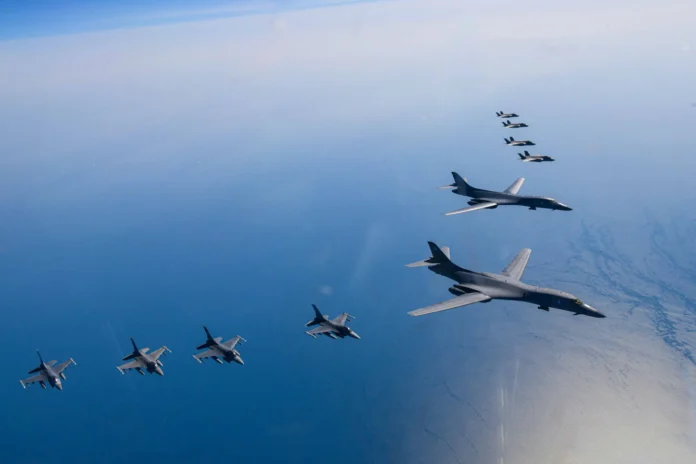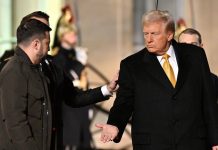SEOUL (Reuters)-North Korea has accused the United States of violating its airspace through surveillance flights, escalating tensions on the Korean peninsula. The country’s Ministry of National Defence issued a statement via the official KCNA news agency, warning that while North Korea was exercising restraint, it may shoot down such flights in the future. The spokesperson cited the use of US reconnaissance planes, drones, and the presence of a nuclear submarine near the peninsula as provocative actions that could lead to a nuclear conflict.
North Korea has previously shot down or intercepted US aircraft near the border with South Korea and off the coast, and it has frequently criticized US surveillance flights in the region. The statement emphasized the potential for accidents and called attention to past incidents involving US aircraft. There has been no immediate response from the US military stationed in South Korea.
South Korea’s military has denied North Korea’s claim of airspace violation, asserting that US air surveillance assets regularly conduct routine reconnaissance flights around the peninsula. They emphasized the close cooperation between the allies in monitoring North Korea’s activities.
The introduction of strategic nuclear assets by the United States to the Korean peninsula was described as “nuclear blackmail” and a significant threat to peace by North Korea. The KCNA report highlighted the potential creation of an extreme situation on the Korean peninsula, holding the US fully accountable for any consequences arising from future actions.
In a separate development, Kim Yo Jong, the influential sister of North Korean leader Kim Jong Un, stated that North Korea would respond decisively if the US military entered its economic zone again, according to state media KCNA.
This escalation comes in the context of joint military exercises conducted by US and South Korean forces, involving an aircraft carrier, heavy bombers, and a nuclear-powered cruise missile submarine. North Korea’s statement specifically criticized the deployment of a strategic nuclear submarine carrying nuclear warheads to the Korean peninsula, the first such deployment since 1981.
While a visit by a US Navy nuclear-armed ballistic missile submarine to South Korea was agreed upon by the leaders of the two countries earlier this year, no specific timetable has been provided. The plan is part of an effort to enhance the deployment of American strategic assets to address North Korea’s threats and weapons tests in support of South Korea.
South Korean President Yoon Suk Yeol expressed the need to demonstrate the international community’s determination to deter North Korea’s nuclear weapons program. He will attend the NATO summit in Lithuania to seek greater cooperation with NATO members in addressing North Korea’s nuclear and missile threats.
North Korea’s accusations against the United States of violating its airspace through surveillance flights, warning that such flights may be shot down. The North Korean Ministry of National Defense spokesperson, as cited by the official KCNA news agency, claimed that these provocative military actions were bringing the Korean peninsula closer to a nuclear conflict. The spokesperson specifically mentioned the use of U.S. reconnaissance planes, drones, and the presence of a nuclear submarine near the peninsula as escalations of tensions.
The statement referred to past incidents where North Korea shot down or intercepted U.S. aircraft near the border with South Korea and off the coast, expressing concerns about U.S. surveillance flights near the peninsula. However, South Korea’s military denied North Korea’s claim of airspace violation, stating that U.S. air surveillance assets conduct routine reconnaissance flights in coordination with South Korea to monitor the North.
North Korea criticized the United States’ introduction of strategic nuclear assets to the Korean peninsula as “the most undisguised nuclear blackmail” against North Korea and the region, posing a grave threat to peace. The article further highlighted Kim Yo Jong’s remarks, the powerful sister of North Korean leader Kim Jong Un, stating that the country would respond decisively if the U.S. military entered North Korea’s economic zone again.
The previous joint military drills between the U.S. and South Korea, involving an aircraft carrier, heavy bombers, and a U.S. nuclear-powered cruise missile submarine. North Korea criticized the U.S. move to deploy a strategic nuclear submarine carrying nuclear warheads to the Korean peninsula, a step not taken since 1981. South Korean President Yoon Suk Yeol emphasized the need to demonstrate international determination to deter North Korea’s nuclear weapons program, ahead of his attendance at the NATO summit where he plans to seek greater cooperation with NATO members regarding North Korea’s nuclear and missile threats.
Overall, the escalating tensions between North Korea and the United States, with North Korea accusing the U.S. of violating its airspace and conducting provocative military actions. The statements from North Korea underscore its concerns about the presence of U.S. strategic assets in the region and its determination to respond decisively if it perceives a threat.






